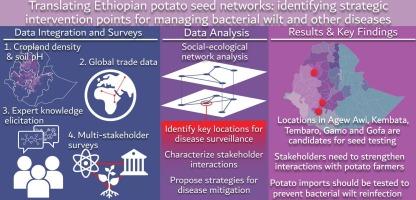Translating Ethiopian potato seed networks: Identifying strategic intervention points for managing bacterial wilt and other diseases
IF 6.1
1区 农林科学
Q1 AGRICULTURE, MULTIDISCIPLINARY
引用次数: 0
Abstract
CONTEXT
Informal seed trade can exacerbate crop disease epidemics. Potato production across Ethiopia is threatened by the spread of seedborne pests and pathogens, particularly by bacterial wilt, caused by the Ralstonia solanacearum species complex (RSSC). The RSSC is commonly dispersed through informal trade of seed potato, with the potential to move long distances across Ethiopia and among trading countries. Efficient disease testing programs and formal seed systems can reduce the risk of disease expansion in national potato cropping systems.
OBJECTIVES
We characterized networks of potato value chain actors. We also identified candidate locations for disease surveillance and management interventions for improved seed systems, and locations at high risk for bacterial wilt establishment. We propose strategies to reduce the spread of bacterial wilt via infected seed.
METHODS
We analyzed seed potato stakeholders' perceptions, characterizing interaction networks of potato value chain actors, focusing on stakeholders engaged in seed potato quality assurance. We collected data regarding Ethiopia's potato seed systems using expert knowledge elicitation and analyzed the risk of national spread of the RSSC and other pathogens. Network metrics were used to characterize the informal seed system in Ethiopia, along with simulations of pathogen spread across an epidemic network in social-ecological scenario analyses. We characterized potato exports and imports, evaluating the risk of pathogen movement through Ethiopia's trading partners and neighboring countries where bacterial wilt has not yet been reported.
RESULTS
Ware potato farmers and traders were reported to have weak communication with other stakeholders in the potato value chain. In network analyses and simulated epidemics, locations in Agew Awi, Gamo, Gofa, Kembata and Tembaro zones were identified as candidate priorities for national surveillance of pathogen invasion and important for management interventions and formal seed system development. Ethiopia has potato commodity trade with countries where bacterial wilt has not been reported, and Ethiopia may be at risk of reintroduction of the RSSC from countries where it is present.
SIGNIFICANCE
Improving seed systems to manage the RSSC and other seedborne pathogens is important for supporting food security and the livelihoods of smallholder farmers in Ethiopia. This analysis provides a baseline for prioritization for implementing surveillance systems and management programs targeting the locations identified, which can be built on as more data and model components become available. Improving communication between ware potato traders and other stakeholders can also help to strengthen informal trade of seed potato and mitigate pathogen spread in infected seed.

转化埃塞俄比亚马铃薯种子网络:确定管理细菌性枯萎病和其他疾病的战略干预点
内容提要 非正规种子贸易会加剧作物病害的流行。埃塞俄比亚各地的马铃薯生产正受到种子传播的害虫和病原体的威胁,特别是由Ralstonia solanacearum物种复合体(RSSC)引起的细菌性枯萎病。RSSC通常通过马铃薯种薯的非正规贸易传播,有可能在埃塞俄比亚境内和贸易国之间远距离传播。高效的病害检测计划和正规的种子系统可降低病害在国家马铃薯种植系统中扩展的风险。我们还确定了为改良种子系统进行病害监测和管理干预的候选地点,以及细菌性枯萎病发病风险高的地点。我们分析了马铃薯种薯利益相关者的看法,描述了马铃薯价值链参与者互动网络的特征,重点关注从事马铃薯种薯质量保证的利益相关者。我们利用专家知识征询法收集了有关埃塞俄比亚马铃薯种子系统的数据,并分析了RSSC和其他病原体在全国传播的风险。我们利用网络指标来描述埃塞俄比亚非正规种子系统的特点,并在社会生态情景分析中模拟病原体在流行病网络中的传播。我们描述了马铃薯进出口的特点,评估了病原体通过埃塞俄比亚的贸易伙伴和尚未报告细菌性萎蔫病的邻国传播的风险。在网络分析和模拟流行病中,Agew Awi、Gamo、Gofa、Kembata和Tembaro地区被确定为全国病原体入侵监测的候选重点地区,对于管理干预和正规种子系统开发也很重要。埃塞俄比亚与未报告过细菌性枯萎病的国家有马铃薯商品贸易往来,埃塞俄比亚可能面临从存在细菌性枯萎病的国家重新引入RSSC的风险。意义改善种子系统以管理RSSC和其他种子传播的病原体对于支持埃塞俄比亚的粮食安全和小农的生计非常重要。这项分析为针对已确定的地点实施监控系统和管理计划的优先顺序提供了一个基准,随着更多数据和模型组件的出现,可以在此基础上进一步发展。改善马铃薯种薯贸易商和其他利益相关者之间的沟通也有助于加强马铃薯种薯的非正式贸易和减少病原体在受感染种子中的传播。
本文章由计算机程序翻译,如有差异,请以英文原文为准。
求助全文
约1分钟内获得全文
求助全文
来源期刊

Agricultural Systems
农林科学-农业综合
CiteScore
13.30
自引率
7.60%
发文量
174
审稿时长
30 days
期刊介绍:
Agricultural Systems is an international journal that deals with interactions - among the components of agricultural systems, among hierarchical levels of agricultural systems, between agricultural and other land use systems, and between agricultural systems and their natural, social and economic environments.
The scope includes the development and application of systems analysis methodologies in the following areas:
Systems approaches in the sustainable intensification of agriculture; pathways for sustainable intensification; crop-livestock integration; farm-level resource allocation; quantification of benefits and trade-offs at farm to landscape levels; integrative, participatory and dynamic modelling approaches for qualitative and quantitative assessments of agricultural systems and decision making;
The interactions between agricultural and non-agricultural landscapes; the multiple services of agricultural systems; food security and the environment;
Global change and adaptation science; transformational adaptations as driven by changes in climate, policy, values and attitudes influencing the design of farming systems;
Development and application of farming systems design tools and methods for impact, scenario and case study analysis; managing the complexities of dynamic agricultural systems; innovation systems and multi stakeholder arrangements that support or promote change and (or) inform policy decisions.
 求助内容:
求助内容: 应助结果提醒方式:
应助结果提醒方式:


